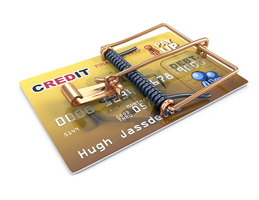 Even if you don’t plan to use credit cards very often, there are times you’ll be glad you have them (such as when you need to rent a car or reserve a hotel room for travel). In order to ensure that this type of consumer credit is always available to you, and that you don’t pay too much for the convenience, you’ll want to have a good credit score. Furthermore, having good credit can save you many thousands of dollars when it comes time to purchasing a home.
Even if you don’t plan to use credit cards very often, there are times you’ll be glad you have them (such as when you need to rent a car or reserve a hotel room for travel). In order to ensure that this type of consumer credit is always available to you, and that you don’t pay too much for the convenience, you’ll want to have a good credit score. Furthermore, having good credit can save you many thousands of dollars when it comes time to purchasing a home.
But you don’t start off with a good credit score by default. Rather, you need to build one over time.
Here in some advice and simple steps for how to build-up your credit score.
Any Credit Is Good Credit. The best way to build your credit score is to actually use credit. Even if you don’t have enough of a credit history to secure credit for large ticket items such as a new car or a new home, you still may qualify for a credit card. If you have a poor credit history, you may only be able to obtain a department store or similar credit card, or perhaps a low limit credit card with annual fees that are slightly higher than you’d otherwise want to pay. These types of accounts can still be valuable. Use whatever credit you have available to demonstrate that you pay your obligations on time.
Pay All Your Bills on Time. In fact, you should make sure to pay all of your bills on time, including your rent, all utility bills and cell phone bills. Increasingly, late payment information for these types of obligations is making its way into individuals’ credit files. Not only will paying your bills on time help save late fees, it can help you keep your credit file clean and build your credit score.
Be Proactive. If you believe that you may not be able to pay one or more of your bills on time, then contact the entity you owe money to before you miss a payment date. Often times, contacting a creditor before a late payment can lead to them modifying your payment terms in the short term, or providing use some temporary relief, thereby keeping your repayment history clean.
Build Slowly and Deliberately. Understand that building your credit record, like many other important financial records, will take some time. Don’t apply for dozens of new credit cards all at once in an effort to build your credit quickly, since a large number of credit report inquiries in a short amount of time may actually lower your credit score.
Get Help. Finally, if you’re still having trouble getting your first credit card, consider getting a co-signer for a new account application, or see if a parent or relative will add you to their existing account. Either of these methods lets you build your credit by relying on the creditworthiness of your family member.
Trying to build your credit also helps to make you more aware of how different actions and behaviors can affect your credit score and your long term financial health. When you’re more aware of these things, you’re more likely to make good financial decisions.
 Even if you don’t plan to use credit cards very often, there are times you’ll be glad you have them (such as when you need to rent a car or reserve a hotel room for travel). In order to ensure that this type of consumer credit is always available to you, and that you don’t pay too much for the convenience, you’ll want to have a good credit score. Furthermore, having good credit can save you many thousands of dollars when it comes time to purchasing a home.
Even if you don’t plan to use credit cards very often, there are times you’ll be glad you have them (such as when you need to rent a car or reserve a hotel room for travel). In order to ensure that this type of consumer credit is always available to you, and that you don’t pay too much for the convenience, you’ll want to have a good credit score. Furthermore, having good credit can save you many thousands of dollars when it comes time to purchasing a home.


